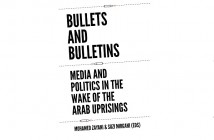By AOMAR OUALI Associated Press
In this May 2, 2011 file photo, Algerian anti riot police… ((AP Photo/Sidali Djarboub))
 ALGIERS, Algeria—Algeria’s Islamists, buoyed by election victories of their brethren across North Africa over the past two months, are looking to triumph themselves next spring in nationwide polls.But Algeria’s Islamists have a bloody legacy of history to overcome—and that complicates their efforts to replicate Islamist breakthroughs in Tunisia and Morocco.
ALGIERS, Algeria—Algeria’s Islamists, buoyed by election victories of their brethren across North Africa over the past two months, are looking to triumph themselves next spring in nationwide polls.But Algeria’s Islamists have a bloody legacy of history to overcome—and that complicates their efforts to replicate Islamist breakthroughs in Tunisia and Morocco.
Algeria witnessed the first victory of an Islamist party in 1991 polls, but the army aborted those elections to keep the Islamists from power. It led to more than a decade of harrowing civil war that claimed an estimated 200,000 lives and left the country deeply traumatized.
Last week, parliament passed a new law that makes it easier to form a political party, opening the way for more Islamist forces competing for power. But it bans from politics former members of the now-outlawed Islamic Salvation Front, the party that won the first round of the elections 20 years ago.
“It is forbidden for those responsible for the exploitation of religion that led to the national tragedy to found a political party or participate in its creation,” says the new law.
One key to the Islamists’ fate is whether they’re able to heal divisions in their ranks.
Unlike in Morocco and Tunisia, Algeria’s Islamists are split up into rival parties, with the most powerful participating in the governing coalition. That may change as the promise of political power helps to overcome old animosities.
“We are not yet at the point of an alliance, but discussions are open,” said Abu Djara Soltani, the leader of the Movement of Society for Peace, the largest Islamist party with 52 seats in the 289-member parliament.
“It is our duty, as Algerian Islamists, to meet the expectations of our society that wants to be ruled by Islamists,” he said.
He described the victory of Tunisian and Moroccan Islamist parties in elections as “a positive inducement” to burying enmities.
But some observers say there may be too much bad blood for the Islamists to band together.
“The latest events do seem to favor the Islamist movement in Algeria, but it is still very divided and there is too much animosity between the different currents to form an alliance in the few months ahead of elections,” said Mohammed Saadi, an Algerian political analyst.
There are at least three legal Islamist parties, with another waiting for approval. The Movement of Society for Peace seeks to change the country from inside the system and holds four Cabinet positions—prompting the other parties to say it has sold out.
The Islah and al-Nahda parties, which together hold 20 seats in parliament take a more confrontational stance to the regime. But if the Movement of Society for Peace were to quit the ruling coalition and offer an alliance they have signaled they might be open to it.
John Entelis, an Algeria expert at Fordham University in New York, said most of the divisions are based less on ideology than personal rivalries between leaders.
“They see themselves in competition, which is what the government wants—them going after each other,” he said.
Like many of the Islamist movements around the region, he said, their rhetoric has become increasingly less about religion. “They minimize the Islamic side of it in favor of the social and economic dimensions,” he said.
Mohammed Said, the leader of the Islamist Party for Justice and Liberty, said the time has come for religious parties in the region because everything else from communism to liberalism has been tried.
“There are now Islamic movements on the scene and I think the Arab-Islamic societies are today ready to let them have their chance,” said Said, whose party is awaiting approval to run in the election.
Even if the Islamists triumph next spring it’s unclear whether the powerful generals who have controlled politics since Algeria’s independence from France in 1962 will allow such a victory.
As President Abdelaziz Bouteflika has fallen ill, the generals have been taking more power back for themselves and appointing supporters to high positions.
In a sense, Algeria was ahead of the rest of Middle East in its pro-democracy movements. Country-wide demonstrations led the government to rewrite the nation’s constitution in 1989, ending the one-party state and allowing pluralistic elections.
That experiment in liberal politics, however, came to a bloody halt with the generals’ coup and the ensuing turmoil which in turn blunted Algeria’s own reaction to the Arab Spring.
Remnants of the old Islamists combatants have joined al-Qaida and sporadic violence continues today, though few expect a return to full-scale war.
While there were pro-democracy demonstrations in Algeria early in 2011 just like its neighbors, they never evolved into a country-wide movement cutting across social classes.
Louisa Hanoun of the Workers Party, a presidential candidate in 2004 and prominent opposition politician, predicted the legacy of past bloodshed will make Algeria the regional exception in May’s elections by not choosing Islamist parties.
“The Algerians don’t have short memories,” she said. “They have not yet healed from the national tragedy.”
—————
Associated Press writer Paul Schemm contributed to this report from Rabat, Morocco.




